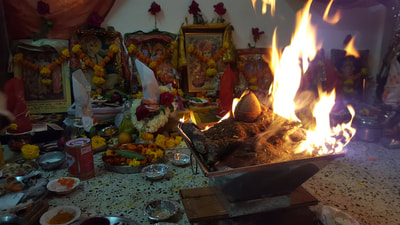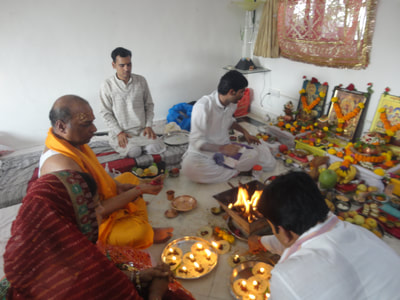|
In Hinduism, one of the essential constituents of religious rites is Yajna (यज्ञ). Yajna, a fire ritual is an act of gratitude to divine and to seek his blessings. Yajna brings material, environmental, psychological and spiritual benefits. Yajna can be performed with a specific desire in mind (sakama yajna), or without any desire, for the benefit of humanity in general (nishkama yajna). Yajna is larger public fire rituals. Homa or Havana is private ritual around a symbolic fire, such as those observed at a wedding.
The primary constituents of a Yajña are the inspiration or urge of the doer (भावना), learning (स्वाध्याय), rites involved (कर्म), offerings (त्याग), deity (देवता) and the results (फल). The process of Yajna is learnt from Vedas & Vedangas. Yajna involves three kinds of offering viz. sacrifice (याग), donation (दान) and offering (होम). The word Yajna is derived from “Yaj” of Sanskrit which means "to worship, adore, honour, revere". The Yajna has its roots in Rigveda, Yayurveda, and Karma Mimansa. Kalpa Sūtrās deal with the rules, regulations and austerities of yajña, the geometry of altars, and the rites to be undertaken at each stage of life. Shulba sutra describes the geometric ratios of Vedi altar, with mathematical precision and geometric theorems. According to Vedic scholars, the main kinds of yajnas are: paka yajna, havi yajna, (pancha) maha yajna, ati yajna and shiro yajna. Each yajna offers a way to purify the senses, mind, mental archetypes, tattwas (elements), gunas or the entire ecological system. Homas are performed in those designated places to the corresponding devatas, according to the rites of the respective Vedas. Major Yajnas/yāgas are performed in premises meant for them, called yāga śālās. The duration of Yajna depending on the type, may vary from a few hours to few months. Depending on the periodicity, the rites (karma) are classified as Nitya karma (done regularly. for e.g. nitya karma is Agni hotra - the homa done thrice a day); Naimittika karma (done on specific occasions. For e.g. pitru tarpana) and Kāmya karma (done optionally with specific purpose e.g. soma yāga and vājapeya). Yajnas are discussed in detail (benefits, constituents, processes, types and relevant Hindu scriptures) as under:-
1 Comment
|
Archives
July 2024
Categories |


 RSS Feed
RSS Feed